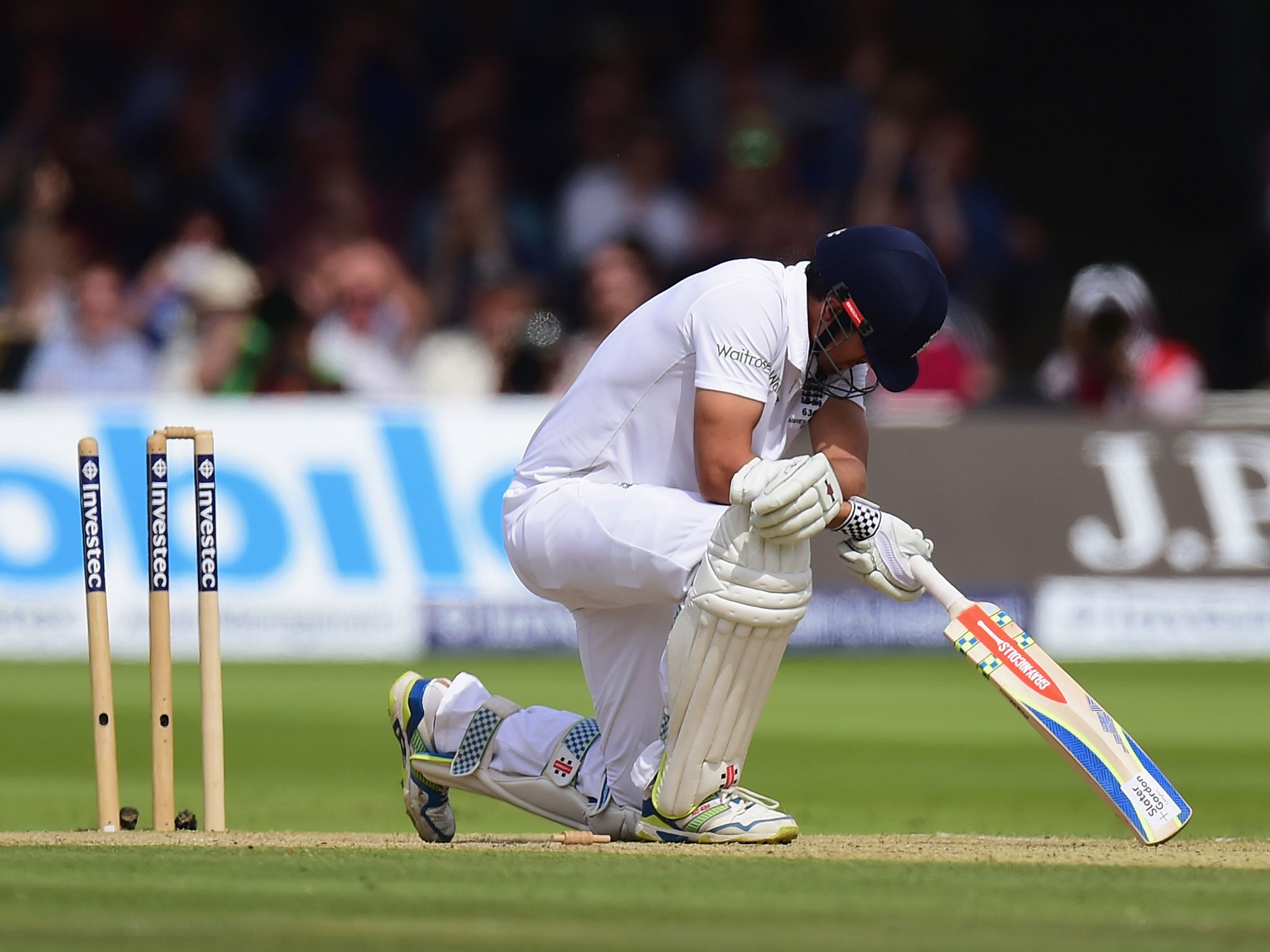Ashes 2015: Declining game in desperate need of heroes
Root and Stokes have chance to restate their credentials as England battle to save Test, says Michael Calvin at Lord’s

Test cricket demands to be taken literally. It tests talent and temperament with trademark mercilessness. Sustained scrutiny reveals more than victims intend, since pressure is applied constantly, insidiously. There is no hiding place.
Such an examination represents a timeless challenge, especially where the Ashes are concerned. The absorbing intensity of yesterday’s play at Lord’s could not be judged in isolation; it was tinged with tribal ritual and framed by history.
It was an occasion which lent itself to lyricism. Lord’s was a study in colour and texture; the green gingham check of the lush outfield contrasted with the supine, straw- coloured pitch and the terracotta splendour of the pavilion.
Ashes Second Test in pictures
Show all 39The sun shone, encouraging languor despite the tension created by England’s fitful resistance. You could be forgiven for ambling to the conclusion that everything was well with the world. Virtues were familiar, even if England’s requirement for a rearguard action over the final two days to save this Test is an all-too familiar scenario.
Alastair Cook’s vigil, nine minutes short of six hours, was a classic of its kind. When he dragged a delivery from Mitchell Marsh on to his leg stump, in attempting a drive four short of a richly-deserved century, he sank to one knee in despair. The manner of his dismissal mirrored that of Ben Stokes, who also seemed set for a place on the Lord’s honours boards.
But who was watching, beyond a capacity crowd that confirmed Middle England’s ability to colonise the great sporting events of our summer? Cricket is a game in search of new heroes when its instinct is to protect and project the old ways.
It is 10 years since paywalls were erected, with promises that the injection of cash from non-terrestrial television would nourish the game at grassroots level. Public money has been invested, to little effect. Instead of addressing domestic concerns, ECB mandarins such as the dismal Giles Clarke prefer to play global politics.
This Ashes series is reaching a minority audience, which appears to be declining. There was something unintentionally emblematic about the lack of children on the outfield at lunchtime, given that such theatrical displays of Kwik Cricket are now a traditional part of the Test tableau.
Cricket’s need to replenish its support base is mirrored by that of baseball, another game of intricacy and subtlety ill-suited to minimal attention spans and modern mores. Each has problems with rapidly-declining participation rates and ageing aficionados.
Half of baseball’s TV viewers are 55 or older, an increase of 9 per cent over the last decade. Only four per cent of the audience for the post-season matches which culminate in the World Series are aged between six and 17.
The ECB suggest two million children have been attracted by their Chance to Shine initiative, but fail to support many of the clubs who have taken on the developmental role traditionally undertaken by schools. Local leagues are also suffering, since many clubs are having difficulty raising senior teams.
Who are the role models for a new generation? Joe Root (left) will doubtlessly have an opportunity to restate his credentials should, as seems likely, Australia declare their second innings closed, sometime around lunchtime today.
The decision not to enforce the follow-on was predictable, since the last time they did so in an Ashes series was in the Melbourne Test in 2002. They batted with ominous ease in yesterday’s final session, and an artillery assault will doubtlessly be triggered by the resumption of hostilities.
The marketeers will pray that Root’s first innings failure is a brief aberration. He has a natural ebullience and a knack of burrowing beneath the skin of his opponents. Stokes, too, has the potential to develop into an entertaining, almost cartoonish character.
Saturday’s partnership with Cook, which yielded 145 runs in 187 minutes, was their second century stand this summer. As a pair they are attractive because they are such contrasting characters, the terminator matched with the accumulator.
Cook was imperturbable. He regally ignored the waspish comments from close fielders. His mental strength, aligned to remarkable powers of concentration, ensured he rarely wavered from the moment he took his leg-stump guard at the start of play.
He shrugged aside being hit on the point of the elbow by Mitchell Johnson, and reached his highest score in 23 Ashes innings stretching back to 2010. By the time of his dismissal, to general disbelief, the odds on his carrying his bat were plummeting.
With his physical strength and his natural inclination to take the fight to the foe, Stokes’ bloodlines can be traced back to Ian Botham. As crass as it sounds, his transition to folk hero will be accelerated by the sort of scrape in which the old all-rounder specialised.
Perhaps he should invite David Warner out for a few liveners in the Earl’s Court Walkabout.
Subscribe to Independent Premium to bookmark this article
Want to bookmark your favourite articles and stories to read or reference later? Start your Independent Premium subscription today.

Join our commenting forum
Join thought-provoking conversations, follow other Independent readers and see their replies